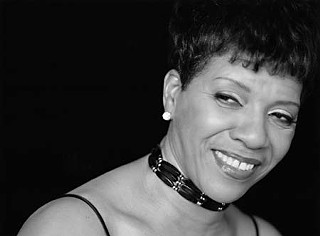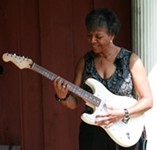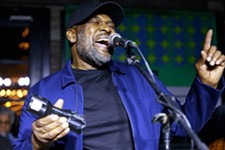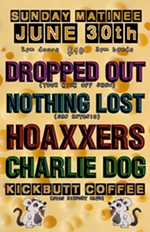Back to Babs
Barbara Lynn at Antone's tonight
By Thomas Fawcett, 3:14PM, Tue. Jul. 29, 2008
Southpaw guitarist and Beaumont-raised R&B legend Barbara Lynn headlines an all-female lineup tonight at Antone’s. Below, the extended Bump & Hustle interview.
Bump & Hustle: When you were growing up in Beaumont, who were some of the artists you heard on the radio that made you want to be a musician?
Barbara Lynn: Well, I loved to listen to people like Connie Francis and Brenda Lee and then people like Gatemouth Brown, Jimmy Reed, the kind of music that I still do. Also, some of the younger music, pop music like Elvis. In fact, I recorded a song of Elvis', “Don’t Be Cruel.”
B&H: So everything from pop to more gritty blues?
BL: Yeah, Muddy Waters too.
B&H: How did you first get into playing the guitar?
BL: Well, I had already started playing piano. My mother put me in piano lessons and I did that for maybe a year but then saw other instruments I wanted to play. I told my mother I wanted to play guitar – that’s the sound I liked and that’s what I wanted to play. My mother worked at a box factory company and her and my father bought me an Arthur Godfried ukulele and that’s how I started playing. You might be too young, you might ask, "Who is Arthur Godfried?" He had a well-known show, something like Ed Sullivan. I started picking little licks on that and my cousin came through from Louisiana and he showed me a few notes too. From then on I acquired most of my knowledge by myself. I could hear something on the radio, and I’d work with it for a while and eventually I would have it down. I guess you could say I was playing ear music from what I would hear.
B&H: Were early female guitarists like Sister Rosetta Tharpe an influence for you?
BL: Oh, yes! How could I forget Sister Rosetta Tharpe! I didn’t know much of her music but I read about it as I got older and I found out she was a guitar player too. I would always hear my parents talking about her.
B&H: What sort of reaction did you get when you started playing out in clubs?
BL: People couldn’t believe their eyes, seeing a young girl playing left-handed! It was so odd for them, both men and women, to see a young black girl, especially around these parts, playing a left-handed guitar and singing the blues. That was really exciting. In fact, my first job after high school was at a club in Hot Springs, Arkansas. Some men up there hired me for about two or three weeks. I was making more money off of my tips than my salary. People were throwing money at me on stage and it wasn’t only dollars, it was five dollar bills sometimes and that all added up to a great amount. I started making a name for myself long before I started recording.
B&H: And you were what age at that time?
BL: Well, I was still in high school when I was doing night clubs around here but the principal of the school could not hear that. So my parents would accompany me along with the band. My mother would go with me mostly everywhere I played. I was still in about 12th or 11th grade so I was probably about 17. I finished school at 18.
B&H: You did most of the songwriting on your first album, something that wasn’t common at the time, particularly for female vocalists. Did you face any resistance to that?
BL: I don’t know because my manager thought it was alright that I had all these songs ready to roll. I was ready! But, yes, I wrote all of those songs except one and that was the song by Jimmy Reed, "You Don’t Have to Go." The rest of those songs were mostly written by me: "Teenage Blues," "You’ll Lose a Good Thing," "Lonely Heartache." I wrote those songs when I was going through school, so by the time I finished high school I had an album ready before I got discovered. I knew that’s what I wanted to do and I wanted to be a recording artist. That was it and that was my dream.
B&H: Were you surprised by your quick success when "You’ll Lose a Good Thing" hit number one?
BL: Oh, was I surprised! I ran all through the house and after that my phone started ringing, oh boy! Yes, indeed, I was really surprised. My manager and I sort of had a good idea that this song might hit but we thought “One Lonely Heartache” – the flip side – would go. It just so happened that they put “You’ll Lose a Good Thing” for the A side and it really took off. I was really excited about that and then my manager started getting calls for me to appear different places. I even appeared on American Bandstand but it was in Philadelphia at that time. It hadn’t moved to California yet. I played there twice.
B&H: Do you have any particularly memorable moments from your time touring in the 1960s?
BL: Yes, indeed, because going back to American Bandstand one of my wigs was kind of crooked, it was slanted. It was so crooked I had to cut it in the dressing room [laughs]. It was still a little crooked but I played the show all the way through. We talked and laughed about that for a long time. I was young and excited. But see, “You’ll Lose a Good Thing” didn’t start really moving until Jamie Records picked it up. When it came out on my manager’s label it was local. When Jamie Records in Philadelphia heard it, they broke it open. That’s when it crossed over into the pop market.
B&H: Were there any DJs in the Houston area or in Texas that helped jump start that record?
BL: Out of Philadelphia they had a very big disc jockey named Jocko but I think he died. He was the one that really started playing the record. Then I had some good disc jockeys here in my hometown [of Beaumont] like Boy Brown, Cal Weaver, and Willie Knight. Anything I would record they would hurry and put it on the air with me being a local singer steady making it big. But I’ve seen jocks throw some singer’s records straight in the garbage can, just throw them away, but they kept mine going for me! They were very instrumental in really helping that song to grow and grow and reach the Top 100 list. I’ll never forget them.
B&H: Why did you end up leaving music in the 1970s?
BL: A lot of people ask that. It’s not that I left, but I had gotten married in 1968 and had a child in 1969. The traveling for me had slowed down and I had to raise my children and today I have three grown children and seven grandchildren. I had to slow down there for a while and I couldn’t go back in the studio cause I didn’t have the spirit right then and there. My babies were coming first so, you know, sometimes I didn’t feel good but I never stopped writing. I kept the writing going to hopefully get ready for another one.
B&H: You had other priorities. Life happened, right?
BL: Yes, indeed, my children were my first priority.
B&H: When did you get back into music?
BL: It was in the late 1980s. I was in California at the time when a promoter saw me perform in San Francisco with a doo-wop group. He came backstage and talked to me. The name of that record company is ITT Records out of Beverly Hills. So he recorded me and also Antone’s Records when Clifford Antone was still there. He talked to me about recording. In fact, Clifford would always say, “Barbara, you need to put all that other music down and come in the studio and let us record a strong blues album with you.” He would always tell me, “Let’s do the blues.” He felt all that other music was just garbage. He said the blues will always be around and he told the honest-to-god truth. Oh, I miss Clifford so much. I think about him all the time. All I had to do was pick up the phone and he'd say, “Come on over, honey.” And I think his sister Susan is wonderful too. The whole Antone family has always tried to help me. If things slowed down here I could call them and they would add me onto shows or whatever. I really feel good about working for them.
B&H: At your upcoming show at Antone’s you’re headlining a lineup of all female musicians, most of whom are guitarists. Would that have even been possible when you first came out, to have a lineup of all women guitarists?
BL: Not to my knowledge. Everybody I worked with was mostly male. If you were to see a female bass player on stage in the 1960s, you’d be really star-struck because, especially down here, I didn’t see much of it around. I found out that female players can hold their own just like a male can!
B&H: Have you done any recording since the album on Dialtone Records [Blue and Soul Situation]?
BL: I haven’t done anything else with them but I might be signing up with Daptone Records out of Brooklyn. Boy, they have been calling me. They saw me perform about a year ago at the Ponderosa Stomp in Austin and they’ve called me several times. They are on tour right now but I think some time in September they have a week open and I’m going up there to record. They want to do a single and see what happens from that. Then we’ll go back in the studio and record a full LP.
B&H: That would be fantastic, that’s a great record label.
BL: I know it. I’ve been hearing such good things about them.
B&H: Are you familiar with Sharon Jones?
BL: I am now because the company sent me two of her CDs and I have them in my car. I’m trying to get the feel of her style of music as well. They want me to write my own songs but, yeah, they’ve sent me some of her music and boy, the Dap-Kings are something!
B&H: Congratulations on that. Anything else you want to add?
BL: Tell my Austin fans that I’m looking forward to seeing them. Come on into the place on the 29th and let’s have a blues party!
A note to readers: Bold and uncensored, The Austin Chronicle has been Austin’s independent news source for over 40 years, expressing the community’s political and environmental concerns and supporting its active cultural scene. Now more than ever, we need your support to continue supplying Austin with independent, free press. If real news is important to you, please consider making a donation of $5, $10 or whatever you can afford, to help keep our journalism on stands.










